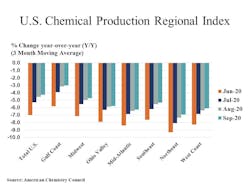US chemical production expanded in September
WASHINGTON, Oct. 22, 2020 (PRNewswire) — According to the American Chemistry Council (ACC), the U.S. Chemical Production Regional Index (U.S. CPRI) rose 0.8 percent in September following a 0.8 percent gain in August and a 1.0 percent increase in July. During September, chemical output expanded in all regions, with the largest gains occurring in the Northeast. The U.S. CPRI is measured on a three-month moving average (3MMA) basis.
In September, chemical production continued to improve in many segments, including, chlor-alkali, organic chemicals, industrial gases, synthetic dyes and pigments, consumer products, synthetic rubber, manufactured fibers, other specialty chemicals, and fertilizers. Production eased in plastic resins, coatings, adhesives, and crop protection chemicals.
As nearly all manufactured goods are produced using chemistry in some form, manufacturing activity is an important indicator for chemical demand. The recovery continued at a slower pace into September, with overall factory activity up 1.6 percent on a 3MMA basis. Production rose in nearly all key chemistry end-use industries that ACC tracks, with the strongest gains occurring in motor vehicles, aerospace, iron and steel, tires, and structural panels.
Compared with September 2019, U.S. chemical production was off 4.3 percent on a year-over-year (Y/Y) basis, the sixteenth consecutive month of Y/Y declines, but an improvement over the past several months. Chemical production remained lower than a year ago in all regions, with the largest year-ago declines occurring in the Northeast, Mid-Atlantic and West Coast regions.
The chemistry industry is one of the largest industries in the United States, a $565 billion enterprise. The manufacturing sector is the largest consumer of chemical products, and 96 percent of manufactured goods are touched by chemistry. The U.S. CPRI was developed to track chemical production activity in seven regions of the United States. The U.S. CPRI is based on information from the Federal Reserve, and includes monthly revisions as published by the Federal Reserve. In order to smooth month-to-month fluctuations, the U.S. CPRI is measured using a three-month moving average. The reading in September reflects production activity during July, August and September.

